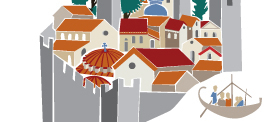Byzantine Customs and Traditions
Many of the customs that existed
in the life of the Byzantines followed the cycle of life from birth to death,
and was closely linked with their religious traditions.The birth of a
child brought great joy to the byzantine family, consummating thus the
marriage. For women, who were
generally considered responsible for the couple's fertility, marriage and
procreation fulfilled their social purpose. The acquaintances and friends who
came to congratulate the couple for the acquisition of their baby, apart from
their wishes for happiness and longevity, also offered gifts such as fruits,
nuts, candies, and even coins, depending on their economical status. Birth was
usually celebrated with banquets, dances and songs, while the birthday was
celebrated with gifts and feasts. After the 9th century immediately after
birth, the parents were usually looking for information concerning the
horoscope and future of their child.
Birth was followed by baptism, which in the early years of Christianity took place in old
age, after the Christians to be
have spent a trial period of
catechism. Shortly after, the high infant mortality rate led to the
establishment of the age of three as the most suitable for baptism. Later, a
law of Emperor Leo the Wise defined that infants should be baptized forty days
after their birth, so that their mother too could attend the sacrament. During the ritual of baptism the
child received its name. Initially, parents preferred to name their children
after their grandparents which had names related to the antiquity (national). But the prelates of the church that did not approve
that practice, prompted the Christians
to choose after the names of saints, apostles and martyrs, or even names
related to celebrations (Epiphanius, Paschalios) or virtues, and this was
established from the 4th century onwards.
Marriage held a significant part in the life of the
Byzantines; it was
the
most
important
institution
in
Byzantium
that regulated partnership between people of different sex and legitimized
their offspring. For the church,
wedding was a mystery in which man and woman were blessed to live in peace and
mutual love, in imitation of the holy union of Christ with the Church. With marriage men fulfilled their role, the
continuation of the family, while women fulfilled their social purpose,
motherhood. According to Byzantine law, marriage
could take place when the woman had reached twelve years of age and the man
fourteen, ages that surely were related with the possibility of procreation,
as well as with the high rate of infantile and juvenile mortality. Women
of that time did not have the freedom to choose their own spouse. The father,
following the roman traditions, was the one deciding for his daughter's
husband. According to the
Justinian legislation, without his consent a marriage could not be performed.
On the other hand, death in
Byzantium, as in antiquity, did not mean the end of life; it was just perceived
as the transition from an earthly life to another, eternal one. Many customs
associated with death and burial in the Byzantine period have been preserved
even to this day in the Orthodox East. The best possible death for someone was
considered the one finding the man at home, with his family surrounding him,
expressing him their love and forgiveness and ready to listen and accept his
final wishes. Today, excavations of Byzantine cemeteries reveal many customs
associated with the burial, the funeral of the deceased, the types of graves,
the objects accompanying the dead, as well as the way of dressing and adorning
them.
Glossary (0)
Information Texts (1)
Leo VI :
Byzantine Emperor
from 886 to 912. Leo was also known as the Wise or the Philosopher on account
of being highly cultivated. He distinguished himself as an accomplished writer
and enthusiastic orator, writing poems, speeches and a military textbook, the Taktika. As emperor he attempted to
restore order to internal political life in the empire. His foreign policy might
be regarded as a failure, since during his reign Byzantium lost many provinces, while large
cities such as Thessaloniki
and the capital were besieged and plundered. He married four times in order to
produce a male heir, thus incurring the disapproval of the church; in order to
obtain permission for his fourth marriage he appointed Euthumios to the patriarchy
in place of Nicholas Mystikos, who was against him. Amid stormy protests he eventually
married Zoë Karvounopsena, who gave birth to the future emperor Constantine VII
Porphyrogenitus.
Bibliography (0)
Comments (0)






